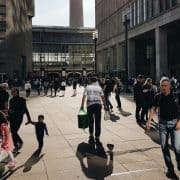|
Getting your Trinity Audio player ready...
|
According to the latest African edition of the Global Corruption Barometer, launched today by Transparency International in partnership with Afrobarometer, the majority of Africans (58%) say that corruption has increased over the past year, while in South Africa more than four out of five citizens (83%) believe that corruption is on the rise.
David Lewis, executive director of Corruption Watch, commented: “The survey was conducted over the period in which the respondents witnessed government’s response to the Public Protector’s Nkandla report.
“We believe that the extraordinarily high number of South Africans who perceive corruption to have increased reflects everyday experience, but principally reflects public judgment on the Nkandla fiasco, as does the very high number of South Africans (79% of those surveyed) who believe that their government is doing badly in fighting corruption.”
South Africans end the year with the Nkandla issue unresolved and with several major corruption scandals on the boil, Lewis added. “We think particularly of the evolving Prasa matter, as well as growing disquiet surrounding allegations of corruption in the relationship between Neotel and Transnet.”
The survey covered 43 143 respondents across 28 countries in sub-Saharan Africa. They were asked about their experiences and perceptions of corruption in their respective countries. While 47% of the respondents saw the police as the most corrupt group, 42% perceived most business executives to be corrupt. This is the first time that business executives have made it on to the list of the most corrupt group.
The report, titled People and Corruption: Africa Survey 2015, states that 18 out of 28 governments are seen as fully failing to address corruption by a large majority. In South Africa, 79% of the respondents stated that the government is doing badly in fighting corruption, while citizens of countries like Botswana, Lesotho, Senegal and Burkino Faso see low levels of corruption in their public institutions.
More encouraging, just over 50% of the respondents – 56% in South Africa – believe that ordinary people can make a difference in the fight against corruption. The survey found that 25% of respondents in South Africa believe that the most effective way for ordinary citizens to combat corruption is by reporting their experiences, followed by a further 22% who identified the refusal to pay bribes as an effective means to fight corruption.
Lewis commented: “This is consistent with our experience. In the space of nearly four years we have received thousands of reports of corruption from the public. That South Africans have refused to accept corruption as a way of life is the most encouraging finding of this survey.”
Download this press statement.
For more information:
David Lewis – 082 576 3748
Moira Campbell – 083 995 4711








